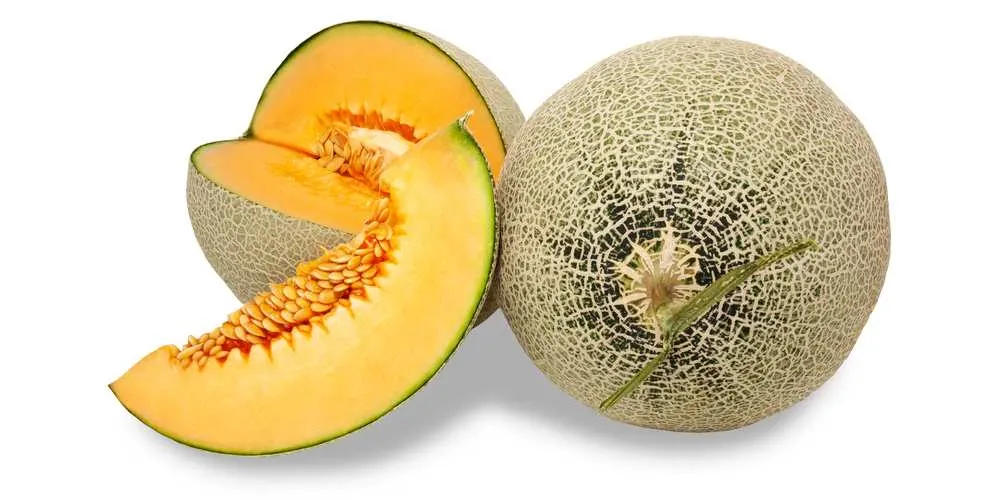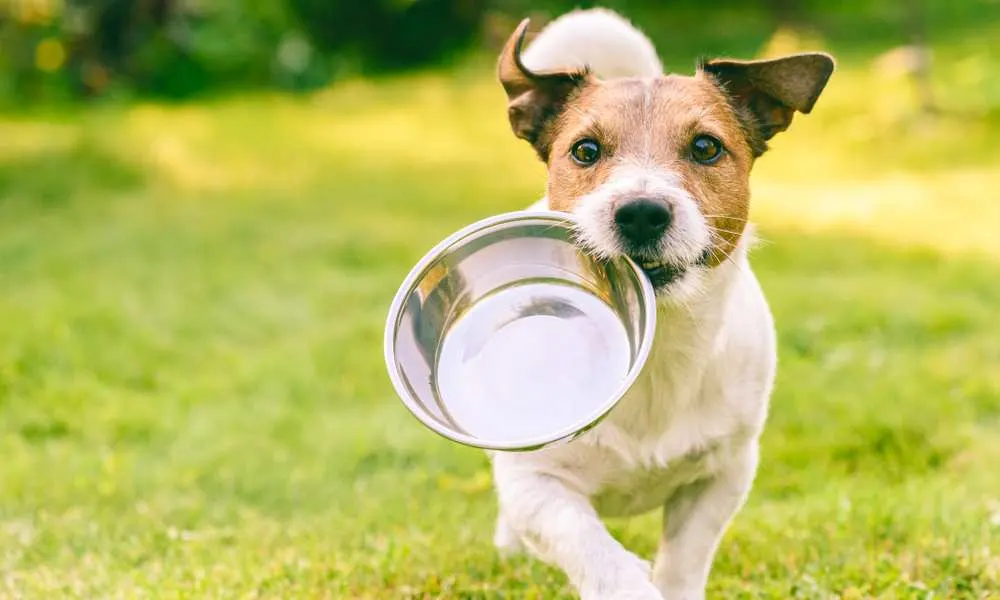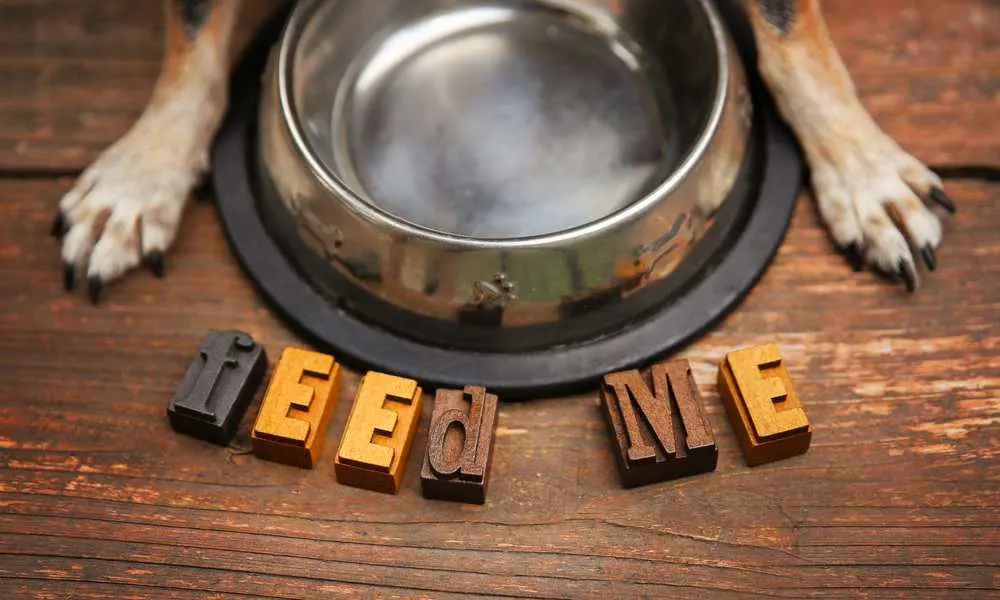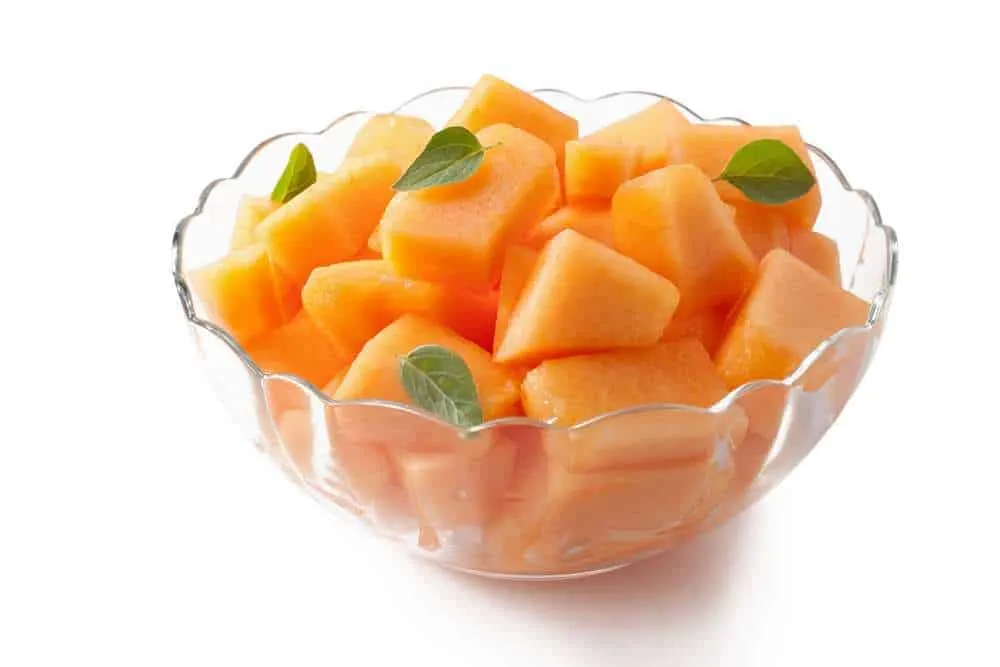We all know the signature scent of cantaloupe. The sweet, syrupy smell lets us know when cantaloupe is ripe long before we cut into the tough outer hull to see for ourselves.
If cantaloupe smells good to us, with our six million scent receptors, think how good it smells to our dogs, with their 300 million scent receptors!
But just because your dog is staring up at you with those soulful, longing eyes doesn’t necessarily mean you should share everything you eat with your pup.
Can dogs eat cantaloupe? That is the question on the table in this article. Is cantaloupe good for dogs? Is it safe for dogs to eat cantaloupe? Is there anything special you need to know about dogs eating cantaloupe?
Read this article to find out if dogs can eat cantaloupe safely.

Can Dogs Eat Cantaloupe?
Imagine you are your dog. You love playing with balls. You look at a ball and think “playtime! fun!” Now imagine the ball you are looking at has a rich and delicious fragrance wafting towards your nostrils.
Leave a cantaloupe out unattended and you may just return to find….no cantaloupe.
So yes, dogs can eat cantaloupe. But should they? Is it safe to give your precious pup a slice of cantaloupe as a treat?
According to the American Kennel Club (AKC), the short answer here is “yes.”
In fact, not only is it safe for your dog to eat cantaloupe, but it is actually a healthy treat because of the many vitamins and minerals this fruit has to offer. And it has a high water content to offset the sugar content to some degree.
However, there are also some risks involved with feeding cantaloupe to your dog. There are some things you should never do. Let’s talk about those now.

Can Cantaloupe Be Dangerous For Dogs?
As with so many fruits, not all parts of the cantaloupe are safe for dogs to eat.
Cantaloupe is a rind fruit. This means it has a hard outer rind or hull. It is also a seeded fruit. The seeds are contained in the center of the fruit. So there are three main parts to the cantaloupe: the fruit itself, the rind, and the seeds.
1. Cantaloupe Rind
The cantaloupe rind is thick, tough, and fibrous. It is designed to protect the fruit from anything that wants to eat it!
This is why it is not safe for your dog to eat the cantaloupe rind. Of course, this doesn’t mean your dog won’t try to chew on the rind or even swallow it.
But this is where the danger starts to show itself.
For dogs that view thick cardboard as an easy challenge and so-called “indestructible” dog toys as a warm-up, it may feel tempting to let your dog chomp down on the cantaloupe rind.
But this is exactly why you should resist the urge.
The cantaloupe rind isn’t designed to be chewed and swallowed. It can hurt the sensitive gums and tissues of your dog’s mouth, opening up and letting in infection.
If swallowed, the cantaloupe rind can cause perforation and potential impaction that causes constipation, vomiting, stomach pain, and worse.
Of course, sometimes dogs just get into things they shouldn’t and chew and swallow things you wish they hadn’t. In these cases, don’t panic, but never ever wait. Always call your canine veterinarian right away or take your dog to the nearest veterinary urgent care center.
2. Cantaloupe Seeds
Unlike the seeds of many fruits, cantaloupe seeds are non-toxic to dogs.
So while they aren’t the tastiest part of the cantaloupe fruit, if your dog happens to ingest a few along with the fruit, it won’t cause any harm.
3. Cantaloupe Fruit
The cantaloupe fruit is not just the yummiest part of the cantaloupe.
It is also the place where you find all the nutrients, vitamins, and minerals that can make cantaloupe a tasty and healthy snack for your dog – in moderation, of course.

Is Cantaloupe Nutritions For Dogs?
As Vet Street explains, cantaloupe is a very healthy and nutritious treat for dogs.
The one exception may be if your dog is overweight or has been diagnosed with diabetes.
As Sunrise Veterinary Clinic explains, in this situation, always talk with your veterinarian before offering your dog any cantaloupe.
Cantaloupe is high in sugar and calories and your vet may want you to adjust portion sizes accordingly or not feed this fruit.
Otherwise, cantaloupe is fine to offer as a treat for your dog. Cantaloupe can provide some beneficial vitamins and minerals to keep your pup healthy.
Even better, most dogs do not have allergic reactions to eating cantaloupe – even when they may have known allergies to other foods. But always watch your dog carefully for any warning signs just the same.
Dogs Naturally Magazine highlights the benefits of these major nutrients in cantaloupe.
| Dietary Fiber: | As we mentioned in an earlier section here, cantaloupe can be great for dogs that need a little boost in the insoluble fiber department. |
| Beta-carotene: | Beta-carotene is a super nutrient that helps prevent cellular damage and can be cancer-fighting. |
| Magnesium: | Magnesium protects against kidney stone formation and improves overall cardiovascular health. |
| Potassium: | Potassium is perhaps the most important naturally-occurring electrolyte in the body and is essential for cellular hydration and heart health. |
| Vitamin A: | Vitamin A promotes healthy vision and skin and can also support healthy bones and teeth. It is also thought to be an anti-aging vitamin. |
| Vitamin B1 (thiamine): | Vitamin B1 is an important anti-stress agent and can improve digestion and nervous system function. |
| Vitamin B3 (niacin): | Vitamin B3 is important for cardiovascular health, circulation, energy, digestion and skin. |
| Vitamin B5 (pantothenic acid): | Vitamin B5 helps with wound healing, healthy blood, immune system response and overall stamina. |
| Vitamin B9 (folic acid): | Folic acid, or folate, supports healthy iron absorption and utilization. It also is vital for producing healthy puppies! |
| Vitamin C: | Vitamin C is best known for its immune-supporting, disease-fighting powers. But it is also a vital antioxidant that fights stress and aids in tissue repair. |

How Should You Feed Cantaloupe To Dogs?
Cantaloupe is so tasty and easy to eat your dog might happily wolf down the whole fruit if you aren’t in charge of portion control!
But here is why you don’t want to let your dog do this.
Along with all those great nutrients, vitamins, and minerals, cantaloupe is packed full of insoluble dietary fiber and water.
In moderation, cantaloupe can help promote healthy digestion and elimination.
In excess, cantaloupe can cause gastrointestinal upset and diarrhea.
This effect intensifies for smaller dogs and dogs with sensitive stomachs.
You should always adjust the portion of cantaloupe you offer to the size of your dog. While a large breed dog could eat a whole slice or two and likely do just fine, a small breed dog should have just a cube or two.
According to Dog Nutrition, fruits and vegetables should comprise no more than 10 to 20 percent of your dog’s daily diet.
You should also rotate which fruits and vegetables you offer to make sure your dog is getting variety in the nutrients, vitamins, and minerals being offered.
If you don’t feed a pure protein raw diet, then be sure to check your dog’s regular food to see the percentage of fruits and vegetables the food offers and adjust the portion of any extra fruits and veggies accordingly.

Should Dogs Eat Cantaloupe?
As with any new food or treat, it is important to never assume your dog can eat and tolerate cantaloupe.
Instead, just start small. Even if your dog is enormous, just offer a small wedge of cantaloupe at first.
Then wait 24 hours and watch for any signs of allergy or intolerance. If you don’t see anything worrisome, you can offer another wedge of cantaloupe at the next treat time.
After that, if your dog seems to enjoy cantaloupe, you can begin to let your dog eat some cantaloupe regularly. It can also be fun to puree and freeze cantaloupe to make pup-sicles in the summer!
In this way, cantaloupe can make a healthy, tasty addition to your dog’s regular menu of treats.
Learn More: What Can Dogs Eat? A Comprehensive List Of Dog-safe Foods


